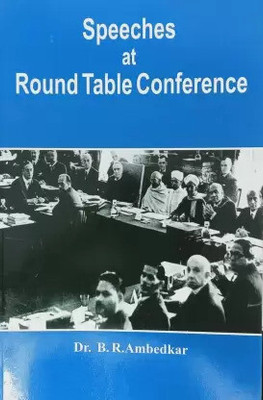Speeches at Round Table Conference + Who Were the Shurdas (Combo of 2 Books Set)(Paperback, DR. B.R. AMBEDKAR)
Quick Overview
Product Price Comparison
Dr. B.R. Ambedkar's speeches at the Round Table Conferences held in London between 1930 and 1932 are significant for their powerful advocacy of the rights and interests of the depressed classes, which he often referred to as "Scheduled Castes" or "Dalits." He was a vocal critic of the caste system and passionately argued for the political representation and social equality of these marginalized communities.Key Points from Ambedkar's Speeches at the Round Table Conferences:Political Representation: Ambedkar argued for separate electorates and reserved seats for the Scheduled Castes to ensure their adequate representation in legislative bodies. He believed that without political power, the depressed classes would remain at the mercy of the upper castes.Social Equality: He emphasized the need for social reforms to eliminate untouchability and caste discrimination. Ambedkar pointed out the systemic injustices faced by the Scheduled Castes and argued for legal and social measures to uplift them.Economic Rights: Ambedkar highlighted the economic exploitation of the Scheduled Castes and demanded measures to improve their economic condition, including access to education and employment opportunities.Separate Electorates: One of the most controversial aspects of his demands was the call for separate electorates for the Scheduled Castes, which was opposed by Mahatma Gandhi and other Congress leaders. This eventually led to the Poona Pact in 1932, where Ambedkar agreed to reserved seats within the general electorate in exchange for greater representation.Who were the Shudras?The Shudras are the fourth varna (social class) in the traditional Hindu varna system. They are traditionally considered the laboring class, responsible for serving the other three varnas: Brahmins (priests and scholars), Kshatriyas (warriors and rulers), and Vaishyas (merchants and landowners). The Shudras were historically marginalized and often subjected to social and economic discrimination.Key Characteristics of the Shudras:Occupational Role: The Shudras were primarily engaged in various forms of labor, including agriculture, craftsmanship, and service roles. They were expected to serve the higher varnas and had limited access to education and religious rites.Social Status: The Shudras were considered to be of lower social status compared to the other three varnas. They were often subjected to social restrictions and discriminatory practices.Caste System: The caste system in India was rigid, and the Shudras were at the lower end of this hierarchy. This often led to economic exploitation and social oppression.Modern Perspective: In contemporary India, efforts have been made to improve the social and economic status of the Shudras through affirmative action, education, and legal reforms. However, caste-based discrimination still persists in some areas.Dr. Ambedkar's work and advocacy played a crucial role in challenging the caste system and striving for the upliftment of the Shudras and other marginalized communities in India. His contributions continue to inspire movements for social justice and equality.


